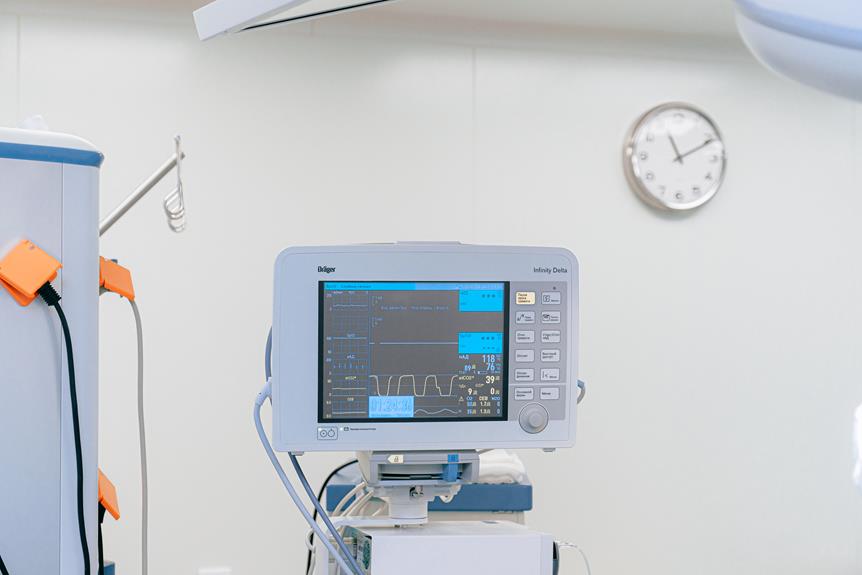Hernia Mesh
Hernia mesh, a silent workhorse in the medical field, is not without its shadows. Despite its crucial role in supporting tissue around hernias, it has been linked to severe complications. This article unravels the complex world of hernia mesh, shedding light on its diverse types, manufacturers, and the FDA's role in regulation. It also delves into the human impact, recounting patient experiences and exploring the future of this essential yet controversial medical device.

Key Takeaways
- Hernia mesh is a commonly used medical device in hernia surgeries, with 90% of hernia surgeries in the U.S. annually involving the use of mesh.
- The U.S. FDA has linked recalled meshes to hernia mesh complications, including bowel obstruction and perforation.
- Hernia mesh can be made from synthetic materials like polypropylene or animal-derived materials, and it can be absorbable or non-absorbable.
- Common complications of hernia mesh include pain, infection, hernia recurrence, adhesion, bowel obstruction, and organ perforation. Thousands of people have filed lawsuits due to these complications.
Understanding the Role of Hernia Mesh
The role of hernia mesh, used in approximately 90% of hernia surgeries conducted annually in the U.S., is primarily to provide support to the damaged tissue around hernias, thereby aiding in the healing process and reducing the risk of recurrence. Among the potential benefits of hernia mesh are its durability, flexibility, and ability to adapt to the body's movements, all of which contribute to a lower risk of hernia recurrence. However, patient experiences with hernia mesh can vary significantly. While many patients report successful outcomes, others may experience complications such as infection, pain, or mesh migration. These varying experiences underline the importance of a comprehensive discussion between the patient and healthcare provider about the potential benefits and risks associated with hernia mesh.
The Science Behind Hernia Mesh
Delving into the science behind hernia mesh, we aim to shed light on the biomedical principles and technological advancements that contribute to its efficacy in hernia repair. The potential benefits of hernia mesh lie in its ability to provide a supportive scaffold, allowing the body's own tissue to grow and strengthen the weakened area. Its surgical applications are vast, as it can be utilized in various types of hernia repairs. The mesh, often made of synthetic or biological materials, is designed to be flexible yet strong, thereby reducing the risk of hernia recurrence. Technological advancements have also seen the development of absorbable mesh, able to degrade over time. This innovation minimizes potential long-term complications, proving the scientific ingenuity behind hernia mesh.
Different Types of Hernia Mesh
Understanding the spectrum of hernia mesh types, it is essential to note that they vary based on several factors, such as material, design, and coating, each with its unique benefits and potential complications. When understanding hernia mesh materials, we find that they can be absorbable, dissolving over time, or non-absorbable, providing permanent support to the hernia site. In terms of design, hernia meshes come as patches, plugs, or sheets, custom-fit to the patient's needs. Some meshes are coated to prevent adhesions, enhancing comfort post-surgery. Evaluating hernia mesh effectiveness, the choice of type should align with the patient's specific condition and the surgeon's expertise. Each type performs differently, hence the need for careful selection to minimize potential complications and maximize patient recovery.
Leading Manufacturers of Hernia Mesh
Several leading manufacturers, including global giants and smaller startups, dominate the hernia mesh market, and each offers a range of products to address diverse patient needs. Top-tier manufacturers such as Johnson & Johnson, Medtronic, and Becton, Dickinson and Company have long-standing reputations for quality and innovation. These companies, alongside emerging businesses, are at the forefront of advancements in hernia mesh technology, continuously developing and refining products to increase patient safety and improve surgical outcomes. This ongoing evolution in product design and material selection reflects the manufacturers' commitment to patient wellbeing. Advancements in hernia mesh technology, such as the introduction of absorbable and non-absorbable meshes, have significantly expanded treatment options, providing surgeons with a wider range of tools to address various hernia types and patient conditions.
Life Span of Hernia Mesh Repairs
In our discussion on the life span of hernia mesh repairs, we need to consider numerous factors, including the type of mesh used, the surgical procedure, and the patient's overall health and lifestyle. Mesh durability plays a pivotal role in the longevity of the repair. Superior quality meshes can provide stability for many years, reducing the risk of hernia recurrence. Furthermore, the surgical technique employed can significantly influence long term outcomes. Advanced procedures aim to minimize tissue damage and optimize mesh integration. Finally, a patient's health and lifestyle are crucial. Regular exercise, a balanced diet, and abstaining from heavy lifting can prolong the life of hernia mesh repairs. Monitoring these factors is essential for maximizing the effectiveness of hernia mesh repairs.
Potential Complications Associated With Hernia Mesh
The use of hernia mesh in surgical procedures, while generally effective, carries the potential for certain complications that patients should be aware of. Some potential risks include infection, hernia recurrence, adhesion, bowel obstruction, and organ perforation. In some cases, the mesh may shrink or migrate within the body post-surgery, leading to further complications. These risks, although not common, can significantly impact patient outcomes, resulting in prolonged recovery, repeat surgeries, or chronic pain. In fact, numerous patients have filed lawsuits citing such complications. Therefore, it is crucial for patients and medical practitioners to thoroughly discuss these potential complications and evaluate the risk-benefit ratio before opting for hernia mesh repair. This ensures informed decision-making and helps improve overall patient outcomes.
Case Studies of Hernia Mesh Complications
While hernia mesh has proven effective in many instances, there are numerous case studies that highlight the serious complications that can arise. In one case, a patient experienced chronic pain and infection post-surgery, later found to be due to mesh migration and adhesion to the bowel. Another case involved hernia recurrence, leading to additional surgeries to repair the damage. Patient testimonials often echo these experiences, with individuals suffering from complications such as organ perforation, mesh shrinkage, and severe pain. These case studies and patient testimonials underscore the potential risks associated with hernia mesh and the importance of thorough preoperative discussion between patients and their physicians about the potential complications and alternative treatment options.
Analysis of Hernia Mesh Recalls
Scrutiny of various hernia mesh recalls reveals a pattern of issues, including device failure, associated complications, and subsequent patient harm. Many of these recalls have led to a surge in hernia mesh lawsuits, where patients claim severe injuries and demand compensation. An in-depth hernia mesh market analysis shows that despite these recalls, the market is expected to grow. However, it also indicates a shift in preference towards safer alternatives, which might impact future growth. The challenge for manufacturers is to ensure product safety while maintaining their market share. These recalls have significant implications on patient safety, legal aspects, and the market dynamics in the medical device industry, warranting a comprehensive review and strategic response.
Alternatives to Using Hernia Mesh
Given the potential complications associated with hernia mesh, it is essential to explore and understand the various alternatives to using this medical device. Non mesh hernia repair is a viable option, involving surgical techniques that stitch the damaged tissue back together without the use of mesh. Procedures such as the Shouldice or Desarda Repair are often considered. Additionally, natural hernia remedies are gaining attention. These involve lifestyle changes like maintaining a healthy weight, avoiding heavy lifting, and dietary adjustments to reduce intra-abdominal pressure. These methods can be an effective means of managing hernias without surgery. However, their efficacy varies among individuals and should be discussed thoroughly with a healthcare professional. It's clear that patients have options beyond hernia mesh.
Legal Issues Surrounding Hernia Mesh
Although hernia mesh has been a widely used medical device in hernia surgeries, it has also been the subject of numerous lawsuits due to serious complications and device failures experienced by patients post-surgery. These hernia mesh lawsuits often cite severe pain, infection, hernia recurrence, adhesion, bowel obstruction, and organ perforation as the hernia mesh complications and risks leading to legal action. Many of these lawsuits argue that manufacturers did not adequately warn patients and doctors about the potential risks associated with their products. Some cases have resulted in substantial settlements, bringing monetary relief to patients who suffered from complications. However, these lawsuits also highlight the need for rigorous testing and transparency from manufacturers to ensure patient safety.
How to Identify a Faulty Hernia Mesh
Recognizing a faulty hernia mesh involves understanding the symptoms and complications that may arise post-surgery. Potential signs of a defective mesh include persistent abdominal pain, fever, nausea, or vomiting. Increased tenderness or a noticeable lump at the surgical site may also signify a problem. These symptoms could indicate mesh failure, where the device has migrated, shrunk, or perforated organs. Chronic infections or abscesses are other symptoms suggesting a faulty hernia mesh. In severe cases, bowel obstructions or recurrence of the hernia might occur. If you experience these symptoms post-surgery, seek immediate medical attention. Early detection of a faulty mesh is crucial to prevent further complications. These symptoms should not be ignored as they may be indicative of a serious problem.
The Impact of Hernia Mesh on Patient's Life
The use of hernia mesh in surgical procedures can significantly weigh on a patient's quality of life, particularly if complications arise post-surgery. The impact on quality of life can be quite profound, with potential complications including chronic pain, infection, bowel obstruction, and hernia recurrence. These complications may necessitate additional surgeries, further impacting the patient's physical and emotional well-being. Conversely, successful hernia mesh surgeries often result in improved patient satisfaction, as the mesh provides a sturdy repair and reduces the risk of hernia recurrence. However, the potential for complications underscores the importance of careful patient selection, surgical technique, and post-operative care. Ultimately, the impact of hernia mesh on a patient's life can be either beneficial or detrimental, depending on various factors.
Steps to Take if You Experience Hernia Mesh Complications
If you have undergone hernia mesh surgery and are experiencing complications, it's essential to take immediate steps to address these issues. First, seek immediate medical attention to ensure your health is stabilized. Document your symptoms, as this information can be helpful for both your healthcare provider and any potential legal actions. Reach out to patient support resources, such as online forums or local support groups, to share experiences and gain insights from others. Consult with a legal expert to explore potential lawsuits if you suspect your complications are due to faulty hernia mesh. Remember, you have the right to seek compensation if your quality of life has been negatively affected due to hernia mesh complications.
The Future of Hernia Mesh Technology
Advancements in medical technology are set to shape the future of hernia mesh, with emphasis on minimizing complications and improving patient outcomes. The focus is on future advancements in biomaterials and the design of this vital medical device. Emerging technologies, such as 3D printing, could provide a customized solution to each patient, potentially enhancing the success rate of hernia repair surgeries. Advances in biotechnology may lead to the development of bioabsorbable meshes with fewer long-term complications. Furthermore, nanotechnology might offer new methods for mesh surface modification to reduce adverse tissue responses. These potential innovations signal a promising future for hernia mesh technology, with the ultimate goal of improving the quality of life for hernia patients.
The Role of FDA in Regulating Hernia Mesh
As an integral part of ensuring patient safety, the U.S. Food and Drug Administration (FDA) plays a pivotal role in regulating the use and production of hernia mesh. The organization enforces strict FDA regulations, which manufacturers must adhere to in the development and marketing of these devices. Through rigorous premarket review and post-market surveillance, the FDA ensures that hernia mesh is safe and effective for use. Furthermore, the FDA tracks reports of adverse events related to hernia mesh and can mandate recalls when necessary. In their commitment to hernia mesh safety, the FDA also provides patients and healthcare providers with up-to-date information about the risks and benefits of hernia mesh, thereby promoting informed decision-making in hernia treatment.
Frequently Asked Questions
How Does the Cost of Hernia Mesh Surgery Compare to Non-Mesh Hernia Repair Procedures?
When comparing the cost of surgical procedures, several factors need to be considered. Mesh durability plays a significant role in the long-term cost-effectiveness of hernia mesh surgery. This method often has lower recurrence rates, potentially reducing future medical expenses. Insurance coverage also greatly impacts the out-of-pocket cost for patients. Generally, hernia mesh surgery may have higher upfront costs, but non-mesh repairs can lead to more frequent recurrences, potentially increasing long-term expenses.
What Are the Psychological Impacts of Hernia Mesh Complications on Patients?
Just as a storm can unsettle a calm sea, complications from surgical procedures can significantly disrupt a patient's mental well-being. Specifically, 'Mesh Anxiety' is a term that refers to the psychological distress experienced by patients due to complications arising from certain medical procedures. This emotional distress often manifests as heightened anxiety, depression, and a diminished quality of life, further exacerbating the physical challenges already faced by the patient.
Are There Any Specific Lifestyle Changes Required After Having a Hernia Mesh Implant?
After an implant surgery, certain lifestyle alterations are often necessary. With regards to mesh material choices, the type of mesh used could influence recovery time and post-operative activity levels. In addition, post-operative nutrition plays a significant role in recovery. A diet rich in protein and vitamins can aid wound healing and recovery. It's crucial to follow your healthcare provider's advice on physical activities, diet, and overall lifestyle to ensure optimal recovery and prevent complications.
What Is the Process for Reporting Hernia Mesh Complications to the Fda?
To report complications related to a medical device such as a mesh implant to the FDA, you can use the MedWatch Online Voluntary Reporting Form. This system is designed to collect data about adverse events and product problems. If the product was subject to recalls or legal actions, include this information. It's crucial to provide detailed information about the situation, as it helps in monitoring device safety and can potentially initiate corrective actions.
How Has the Use of Hernia Mesh Influenced the Overall Success Rate of Hernia Surgeries?
The advent of hernia mesh in surgical practices has significantly improved the overall success rate of hernia surgeries. Statistics reveal a remarkable reduction in post-surgery recurrence rates. Different mesh material types, including synthetic and animal-derived, contribute to this success by providing enhanced support to the damaged tissue. Consequently, the use of hernia mesh has revolutionized hernia repair, leading to better patient outcomes and a lower likelihood of recurrence.
Conclusion
In conclusion, the use of hernia mesh, despite its potential benefits, has been shadowed by numerous complications and recalls, akin to a promising yet treacherous path littered with pitfalls. The FDA's ongoing regulatory role, alongside advancements in hernia mesh technology, represent beacons of hope for safer future applications. Meanwhile, the surge in lawsuits serves as a stark reminder of the need for continued vigilance and improved patient safety in the realm of medical devices.

This post has been generated by AI and was not reviewed by editors. This is Not legal advice. Please consult with an attorney.




